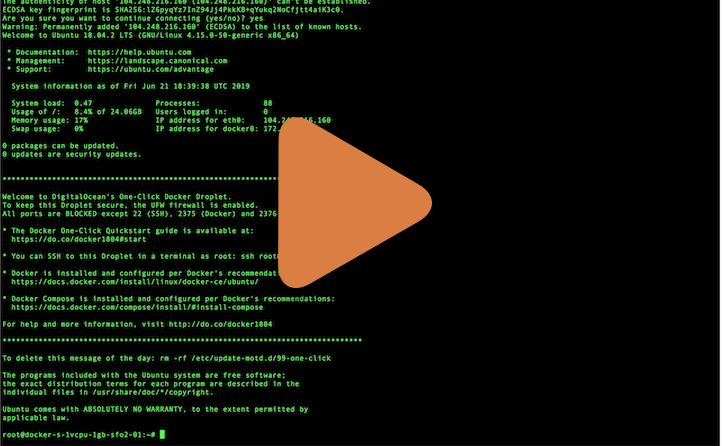🔐DockOvpn
Out of the box stateless VPN server docker image which starts in just a few seconds and doesn't require persistent storage. To get it running, just copy & paste the snippet below and follow instructions in your terminal:
docker run -it --rm --cap-add=NET_ADMIN \
-p 1194:1194/udp -p 80:8080/tcp \
-e HOST_ADDR=$(curl -s https://api.ipify.org) \
--name dockovpn alekslitvinenk/openvpnTo get more detailed information, go to Quick Start tutorial or watch video.
Website
GitHub Repo:
https://github.com/dockovpn/dockovpn
DockerHub Repo:
https://hub.docker.com/r/alekslitvinenk/openvpn
Docker Tags
| Tag | Description |
|---|---|
latest |
This tag is added to every newly built version be that v#.#.# or v#.#.#-regen-dh |
v#.#.# |
Standard fixed release version, where {1} is major version, {2} - minor and {3} is a patch. For instance, v1.1.0 |
v#.#.#-regen-dh |
Release version with newly generated Deffie Hellman security file. In order to keep security high this version is generated every hour. Tag example - v1.1.0-regen-dh |
dev |
Development build which contains the most recent changes from the active development branch (master) |
Environment variables
| Variable | Description | Default value |
|---|---|---|
| NET_ADAPTER | Network adapter to use on the host machine | eth0 |
| HOST_ADDR | Host address to advertise in the client config file | localhost |
| HOST_TUN_PORT | Tunnel port to advertise in the client config file | 1194 |
| HOST_CONF_PORT | HTTP port on the host machine to download the client config file | 80 |
$(curl -s https://api.ipify.org).
More often you'd like to customize HOST_TUN_PORT and HOST_CONF_PORT. If this is the case, use the snippet below (dont forget to replace <custom port> with your values):
DOCKOVPN_CONFIG_PORT=<custom port>
DOCKOVPN_TUNNEL_PORT=<custom port>
docker run -it --rm --cap-add=NET_ADMIN \
-p $DOCKOVPN_TUNNEL_PORT:1194/udp -p $DOCKOVPN_CONFIG_PORT:8080/tcp \
-e HOST_ADDR=$(curl -s https://api.ipify.org) \
-e HOST_CONF_PORT="$DOCKOVPN_CONFIG_PORT" \
-e HOST_TUN_PORT="$DOCKOVPN_TUNNEL_PORT" \
--name dockovpn alekslitvinenk/openvpnContainer commands
After container was run using docker run command, it's possible to execute additional commands using docker exec command. For example, docker exec <container id> ./version.sh. See table below to get the full list of supported commands.
| Command | Description | Parameters | Example |
|---|---|---|---|
./version.sh |
Outputs full container version, i.e Dockovpn v1.2.0 |
docker exec dockovpn ./version.sh |
|
./genclient.sh |
Generates new client configuration | z — Optional. Puts newly generated client.ovpn file into client.zip archive.zp paswd — Optional. Puts newly generated client.ovpn file into client.zip archive with password pswd o — Optional. Prints cert to the output. oz — Optional. Prints zipped cert to the output. Use with output redirection. ozp paswd — Optional. Prints encrypted zipped cert to the output. Use with output redirection. |
docker exec dockovpn ./genclient.shdocker exec dockovpn ./genclient.sh zdocker exec dockovpn ./genclient.sh zp 123 docker exec dockovpn ./genclient.sh o > client.ovpndocker exec dockovpn ./genclient.sh oz > client.zip docker exec dockovpn ./genclient.sh ozp paswd > client.zip |
./rmclient.sh |
Revokes client certificate thus making him/her anable to connect to given Dockovpn server. | Client Id, i.e vFOoQ3Hngz4H790IpRo6JgKR6cMR3YAp. |
docker exec dockovpn ./rmclient.sh vFOoQ3Hngz4H790IpRo6JgKR6cMR3YAp |
📺 Video Guide
🚀 Quick Start
Prerequisites:
- Any hardware or vps/vds server running Linux. You should have administrative rights on this machine.
- Docker installation on your server.
- Public ip address assigned to your server.
1. Run dockovpn
Copy & paste the following command to run docker-openvpn:
docker run -it --rm --cap-add=NET_ADMIN \
-p 1194:1194/udp -p 80:8080/tcp \
-e HOST_ADDR=$(curl -s https://api.ipify.org) \
--name dockovpn alekslitvinenk/openvpnCtrl+P Ctrl+Q.
If everything went well, you should be able to see the following output in your console:
Sun Jun 9 08:56:11 2019 Initialization Sequence Completed
Sun Jun 9 08:56:12 2019 Client.ovpn file has been generated
Sun Jun 9 08:56:12 2019 Config server started, download your client.ovpn config at http://example.com:8080/
Sun Jun 9 08:56:12 2019 NOTE: After you download you client config, http server will be shut down!
2. Get client configuration
Now, when your dockovpn is up and running you can go to <your_host_public_ip>:8080 on your device and download ovpn client configuration.
As soon as you have your config file downloaded, you will see the following output in the console:
Sun Jun 9 09:01:15 2019 Config http server has been shut down
Import client.ovpn into your favourite openvpn client. In most cases it should be enough to just doubleclick or tap on that file.
3. Connect to your docker-openvpn container
You should be able to see your newly added client configuration in the list of available configurations. Click on it, connection process should initiate and be established within few seconds.
Congratulations, now you're all set and can safely browse the internet.
Persisting configuration
There's a possibility to persist generated files in volume storage. Run docker with
-v openvpn_conf:/opt/Dockovpn_dataAlternative way. Run with docker-compose
Sometimes it is more convenient to use docker-compose.
To run dockvpn with docker-compose run:
echo HOST_ADDR=$(curl -s https://api.ipify.org) > .env && \
docker-compose up -d && \
docker-compose exec -d dockovpn wget -O /doc/Dockovpn/client.ovpn localhost:8080After run this command you can find your client.ovpn inside openvpn_conf folder.
Other resources
Contrubition Guidelines
Code Of Conduct
Release Guideline
License Agreement





